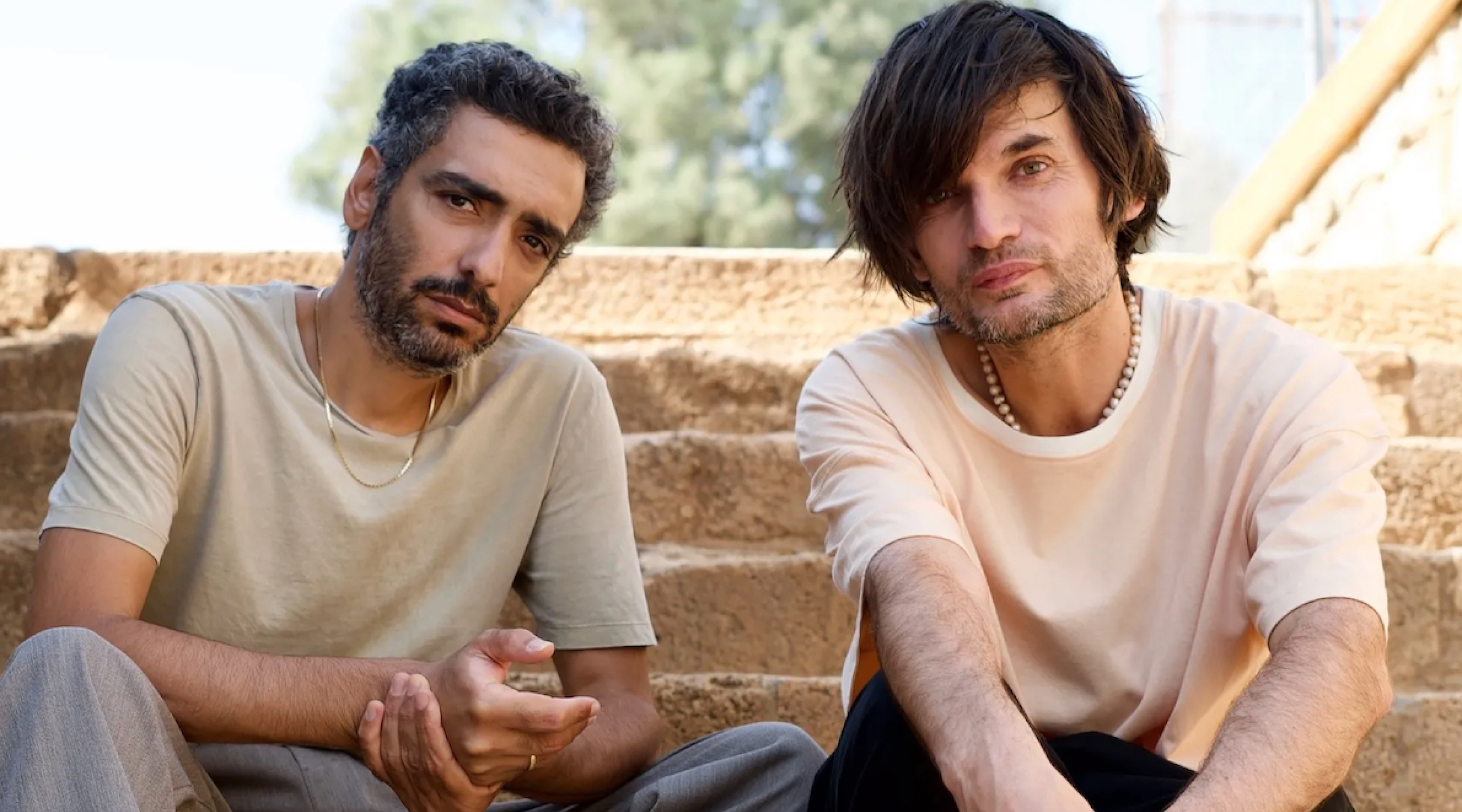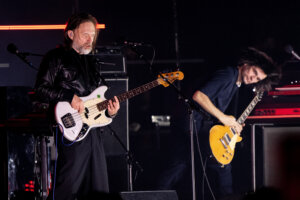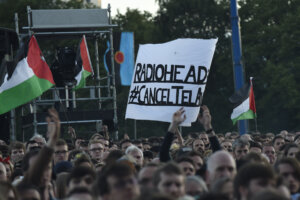Israel critics want Radiohead’s lead guitarist cancelled. He says they’re hypocrites.
Jonny Greenwood features a Palestinian singer on his album. Why do some want his concerts canceled?

Dudu Tassa, left, shown with Jonny Greenwood. (Shin Katan)
Radiohead lead guitarist Jonny Greenwood called out a culture of “censorship and silencing” after pro-Palestinian activists forced the cancellation of a pair of concerts with an Israeli musician.
In a lengthy joint statement posted Tuesday to his X profile, Greenwood and Dudu Tassa said their gigs in London and Bristol had been scrapped due to the venues receiving “enough credible threats to conclude that it’s not safe to proceed.” The cancellations followed a campaign by the Palestinian Campaign for the Academic and Cultural Boycott of Israel (PACBI), a group that opposes any contact with any Israelis, even those active in supporting Palestinians, and that wants Greenwood and Tassa shunned.
PACBI denied making any threats and said on X that the venues, Hackney Church and Bristol Beacon, had yielded to “peaceful BDS pressure.”
The venues did not respond to requests for comment.
The X post contained some of the only public remarks on the Israel-Hamas war from Greenwood, who is married to an Israeli artist he met on Radiohead’s first visit to the country. The band has faced accusations of “artwashing” Israel — that is, normalizing the country through cultural exchange — long before the Oct. 7 attacks made Israel the subject of a relentless international culture war.
— Jonny Greenwood (@JnnyG) May 6, 2025
“We agree completely with people who ask: ‘How can this be more important than what’s happening in Gaza and Israel?’” Greenwood and Tassa wrote in the letter, drawing from an artists’ petition against attempts to censor anti-Israel Irish band Kneecap. “They’re right — it isn’t. How could it be? What, in anyone’s upcoming cultural life, is?”
Greenwood and Tassa also pointed out the hypocrisy of the petition insinuating that the same cohort who would keep the pair from performing were guilty of a double standard.
“As the artist’s statement supporting Kneecap said: ‘As artists, we feel the need to register our opposition to any political repression of artistic freedom’,” they wrote.
Greenwood did not respond to an inquiry.
Loyal fans, loyal band
Radiohead faced similar pressures in 2017 when the band performed in Tel Aviv over the public objection of dozens of fellow U.K. artists who urged them to join their cultural boycott of Israel.
By that point, the band had been playing in Israel for decades. The band broke out in Israel, where their hit single “Creep” dominated airwaves thanks to an Army Radio DJ, before it did in Britain. By the members’ own account, their first visit in 1993 — when Greenwood met his future spouse, Sharona Katan — offered their first glimpse of stardom.
Radiohead’s experimental alt-rock is rarely explicitly political, though it explores broad social themes like alienation and technology. And people might have expected the group to join a wave of Israeli boycotts because it participated in the 1998 Tibetan Freedom Concert.
Instead, the 2017 show went on. The 27-song set was their longest performance anywhere in more than a decade. Nasreen Qadri, an Arab Israeli singer who publicly defended the group leading up to the show, joined them on stage.
“We don’t endorse Netanyahu any more than Trump, but we still play in America,” frontman Thom Yorke said at the time. He added: “Music, art and academia is about crossing borders not building them, about open minds not closed ones, about shared humanity, dialogue and freedom of expression.”
Greenwood never commented publicly on the controversy, and Radiohead hasn’t performed as a group since 2018. But Yorke has continued to fend off criticism as a solo artist, sparring with anti-Israel protesters in Melbourne last year.

Arabic love songs from an Israeli singer
With the band on hiatus, Greenwood has embarked on various other musical projects that include film scoring, a new prog-rock band called The Smile, and in 2023, an album with Tassa, an Israeli of Iraqi descent.
Their album, Jarak Qaribak — the title translates to “Your Neighbor Is Your Friend” — is a collection of Arabic folk songs and features singers from all over the Middle East. In the second single off the album, a Palestinian singer, Nour Freteikh, revives a Lebanese standard. Other songs feature vocalists from Iraq, Lebanon, Syria and Kuwait.
Greenwood and Tassa’s band, Dudu Tassa & The Kuwaitis, were supposed to go on tour after its release, but canceled their plans following the Hamas-led attack on Israel on Oct. 7. One of their first live performances of music from the album came at Barby, a Tel Aviv venue, in June 2024 — two months after Greenwood’s nephew, Reef Harush, was killed fighting in Gaza.
When the decision to play with Tassa inevitably attracted criticism, Greenwood emphasized his belief that the music could unite people of different backgrounds in the region.
“No art is as ‘important’ as stopping all the death and suffering around us. How can it be?” he wrote in June 2024 in a statement on X. “But doing nothing seems a worse option. And silencing Israeli artists for being born Jewish in Israel doesn’t seem like any way to reach an understanding between the two sides of this apparently endless conflict.”
In their statement Tuesday, the duo lamented that the diversity of artists on the album had attracted so many enemies. “For some on the right,” they wrote, “we’re playing the ‘wrong kind’ of music — too inclusive, too aware of the rich and beautiful diversity of Middle Eastern culture. For some on the left, we’re only playing it to absolve ourselves of our collective sins.”

How to disappear completely
After Oct. 7, Greenwood tweeted his condolences to the victims “murdered, raped or abducted in these massacres,” adding, “It is impossible not to despair.” Yet perhaps his most overtly political expression on the war occurred the day before the 2024 Barby concert, when, according to some eyewitness reports, he joined a protest at Hostage Square in Tel Aviv.
Yet as long as Greenwood’s two statements were — eight paragraphs last June; nine in this week’s — inferences about his politics tend to be based on what he hasn’t said. He has not, for example, condemned the Israel-Hamas war or joined calls for a ceasefire. Nor has he disavowed Israel’s use of force or its severe restrictions on humanitarian aid.
Their perceived tacit support for the war that has killed 50,000 Palestinians led PACBI, which is the most prominent organization associated with the Boycott, Divestment and Sanctions movement, to accuse Greenwood and Tassa of “whitewashing Israel’s genocide in Gaza.”
In a string of X posts responding to Greenwood’s Tuesday statement, PACBI said Radiohead, too, should be boycotted “unless they convincingly distance themselves” from Greenwood’s “shameful complicity in artwashing Israel’s genocide in Gaza.”
They noted that in 2014 Barby staff gave Israeli soldiers t-shirts that read “F— you, we’re from Israel,” following the Gaza war of that year.
PACBI is known for its hard-line stances against anything it sees as Israeli “normalization.” The group criticized No Other Land, an Academy Award-winning documentary about settler violence in the West Bank, because it highlights the friendship of a Palestinian facing displacement and the Israeli activist trying to help him.
It’s possible the activist group’s attitude toward the duo only reflects a far-left fringe of cultural discourse. But debate was raging Tuesday on the Radiohead forum on the social media platform Reddit. Several of the top posts on the page related to the controversy; one thread on Greenwood’s statement was locked after it reached 1,300 comments.















